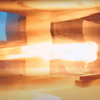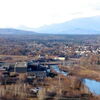Attack of the vandals | A wave of violent protests strikes companies with big plans for Maine
A series of incidents ˆ possibly unrelated ˆ were directed at Plum Creek following its public presentation of a 30-year "concept plan" for development on 426,000 acres of its holdings around Moosehead Lake. This kind of planning by large landowners is encouraged by the Land Use Regulation Commission, which wants to be able to prepare for development over time. But it also had the effect of magnifying what might happen north of Greenville, as Plum Creek unveiled a proposal for nearly 1,000 house lots, four sporting camps, two resorts, three campgrounds and an 18-hole golf course.
There was vocal criticism at four "scoping sessions" around the state held by LURC, but also more violent responses. In May, the night before a scheduled protest by local activists at Plum Creek's Maine headquarters in Fairfield, slogans were painted all over the building, and the sign on the lawn was knocked over and spray-painted with "Leave Maine Alone."
In July, someone broke in Plum Creek's Greenville office and stole several computer hard drives used by foresters and other employees. At about the same, time, a contractor who does logging for the company had two of his skidders driven into the woods and damaged, and a large log pile was strung with computer wire. "They made a big mess," said Jim Lehner, Northeast division manager for Plum Creek, which is headquartered in Seattle.
Finally, at the last LURC scoping session Aug. 24 in Hallowell, Lehner's car was vandalized, with "Leave Maine" scratched into the paint and the tires slashed. In all, the company estimates more than $15,000 of damage to its own property, and at least several thousand more to the contractor's.
On Sept. 11, vandals struck at the West Old Town Landfill, which is owned by the state but operated by Casella. The firm also owns the Hampden landfill; between them, the two facilities receive a significant portion of Maine's solid waste.
The damage was extensive, including spray painting, locks in the building glued shut and an attempt to flood two buildings by turning on outdoor hoses. Equipment damage was significant, and Casella now estimates it will cost more than $40,000 for repairs.
Looking for a messiah
Police have not yet turned up any suspects in any of the incidents, but speculation immediately turned to the possibility of violent protests by extremist environmental groups. In addition to local, county and state police, the FBI office in Portland is assisting the Casella investigation.
Protesters at the Fairfield demonstration in May claimed they had no knowledge of the vandalism; about the closest thing to a sympathetic response was a posting on an independent media website that referred to "decorating" the building, which it said was "graced by demonstrators."
In Old Town, the initials "ELF" were among the spray-painted slogans. A radical group known as the Earth Liberation Front claims to have committed various acts of "environmental terrorism" in western states, including 1998 arson fires on Vail Mountain where the famed Colorado ski area was expanding.
One of the investigators, Old Town Police Detective Seth Bear, told the Bangor Daily News that "We're well aware of what the symbols mean, but anybody can go up and say they belong to it."
Joe Fusco, vice president of Casella at its Rutland, Vt. headquarters, said that the company wasn't necessarily interested in any message the vandals might have been trying to convey. "Destruction of property is a crime, and we see these as criminal acts," he said "This kind of protest, if that's what it is, is just not part of the social compact we all live under."
The various locales and methods involved would seem to make it likely that different people or groups were responsible. The spray painting in Fairfield could be seen as a violent protest; the computer thefts in Greenville were more puzzling to Jim Lehner. He said that entire computer units weren't taken, so they'd have no resale value. But the information on the computers largely involved timber inventories and other routine data, so it also had seemingly little value. Lehner seemed most concerned about the damage to the logging contractor's equipment. "People may not understand that these aren't our employees, that they have nothing to do with our plans and have to make a living on their own," he said.
Casella and Plum Creek are certainly large companies by Maine standards. Casella operates more than 45 landfills and transfer stations in the Northeast, and an additional 39 recycling centers. Plum Creek owns several million acres of land, much of it in the Pacific Northwest, but also in such states as West Virginia, Wisconsin and Michigan, which are also part of its Northeast division.
Though the identities of the vandals aren't yet known, it may be possible to predict something about them. Bill Thornton, a social psychologist and professor of psychology at the University of Southern Maine, said that environmental terrorism, like other forms of targeted violence, is usually carried out by those who feel "disenfranchised by the system." They may have tried more peaceful forms of protest, he said, but believe there is nothing more they can do to stop something they oppose.
"There is of course a huge difference between spray painting and setting off a bomb, but the impulse is the same," he said. At this point, Thornton added, "No one has been hurt, but these incidents can generate a lot of news." If there is any connection at all behind the recent vandalism incidents, he said, it would probably be an attempt to disrupt business by creating a sense of further threat.
People who are likely to engage in violent activity may be experienced but disenchanted members of more moderate environmental groups who don't believe their opposition is effective, Thornton said. Or they may be "a naïve, idealistic person" who is looking for someone to believe in, a leader or "messiah" who seems to provide answers.
Steve Barkan, professor of sociology at the University of Maine and a researcher in criminal behavior, was more guarded in his assessment: "We know a lot of what motivates people to engage in political activity, but not necessarily what causes some to go over into violent behavior," he said. He did say that violent protesters, like those who commit other criminal acts, are more likely to be young, and that older people are more likely to use established, legal channels.
The corporate response
A big question for companies is what, if anything, they can do to prevent or respond to violent acts against their employees or property.
"That's a really tough one," said Dennis Bailey, president of Savvy Inc., a Portland public relations consulting firm with numerous business clients. "There's no easy way to combat it, and often a company's options are quite limited."
Bailey said that the potential for intimidation through violence, or even threats of violence, is real and can definitely affect business plans. He cites the case of a client that was seeking to locate a liquefied natural gas terminal in Harpswell that became the subject of angry clashes at public meetings and elsewhere. Even though the site had deep-water access and was a former fuel depot ˆ factors that seemingly made it ideal for LNG ˆ resistance from fishermen and other locals became intense as soon as plans were announced.
"We tried to work with local supporters to answer questions and criticisms, but it was hard," he said. "Many of them were scared, and feared physical violence if they spoke in public." The town referendum campaign was capped by a bomb threat at the town polling station on election day, "something I've never heard of anywhere in Maine," Bailey said. The proposed LNG plant was defeated. (For more on the current round of LNG proposals in Maine, see "Terminal velocity," starting on the cover.)
While no one expects Plum Creek or Casella to back off their plans because of the vandalism, companies like these should seek to marshal whatever resources they have, Bailey suggested. "One thing they could do is to call a press conference to denounce the violence and invite moderate opponents to join them," he said. Such a strategy would call attention to the illegal nature of the protests, and "if the responsible opponents don't show up, that sends a message, too," he said.
Other than that, it appears, there's not a lot that can be done. Bill Thornton said that, by its nature, vandalism is difficult to predict and nearly impossible to prevent. "You're not going to have a lot of success trying to stay ahead of these people," he said.
Plum Creek has beefed up security in the wake of the spring and summer vandalism. All of its buildings now have security alarms, and the company has hired security firms to patrol remote sites, Jim Lehner said. It has reminded contractors that they should gate all sites where equipment is left, so that vandals cannot simply drive into the area, as apparently happened earlier in Greenville.
Joe Fusco at Casella declined to say what additional security steps the company would take, but said Casella is "actively reviewing" its policies.
While Casella operates over a large area and Plum Creek across most of the country, neither has experienced anything like what's happened in Maine this year. "It just isn't something we've had to deal with earlier," Lehner said.
Not quite business as usual
As it happens, the Legislature considered a bill to "discourage environmental terrorism" four years ago, in the 2001 session. Introduced by former Rep. Joseph Clark (D-Millinocket), the measure was prompted by an incident in which a field of genetically engineered corn on a University of Maine experimental farm was destroyed. Like the more recent incidents, in that case no one has been arrested or prosecuted to date.
While the "environmental terrorism" bill won significant support in the Criminal Justice Committee, it was defeated almost two to one on the House floor. Rep. Ted Koffman (D-Bar Harbor), who now co-chairs the Natural Resources Committee, spoke against the bill. He recalls now that the chief objection was to the bill's description of the proposed crime, the "destruction of property or the interference with a place of businessˆ by individual groups for the primary purpose of protesting a natural resource or environmental issue." It was so broad, he said, that it would have affected peaceful protest just as much as violent ones.
"We found that the existing statutes covered these crimes adequately," he said. Arson and aggravated criminal mischief, he noted, are already felonies under Maine law. Koffman did say, though, that environmentalists ought to be concerned about the recent vandalism. "One of my concerns about the environmental movement is that some of the agendas are not well thought out," he said. "And the turn to violence never helps the cause. There's no way we can convince people we need to halt the destruction of the environment if we use violence ourselves."
There are no known opponents organized specifically against Plum Creek's plan, although it has been criticized by the Natural Resource Council of Maine, among other groups. A local landowner group called We the People in Old Town has filed a lawsuit against the state Department of Environmental Protection over its approval of the state's landfill expansion. The area, once a sludge dump for Georgia-Pacific's papermaking operations in town, was acquired by the state as part of a deal to keep the G-P plant operating.
While neither Plum Creek nor Casella experienced a significant disruption in overall operations from the vandalism, that does not mean it's quite business as usual. "You feel victimized," said Lehner. "You really do. You'd like to believe that this is the kind of thing that doesn't happen in Maine."
Fusco said, "There's a huge difference between people who want to talk and those who commit criminal acts. We've always been proactive in the public debate, and we want to continue that approach. That's what we've always done, and what we plan to do in the future."










Comments